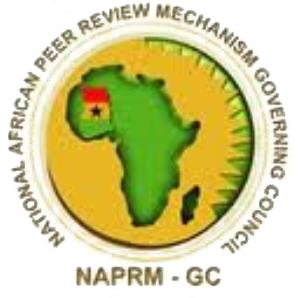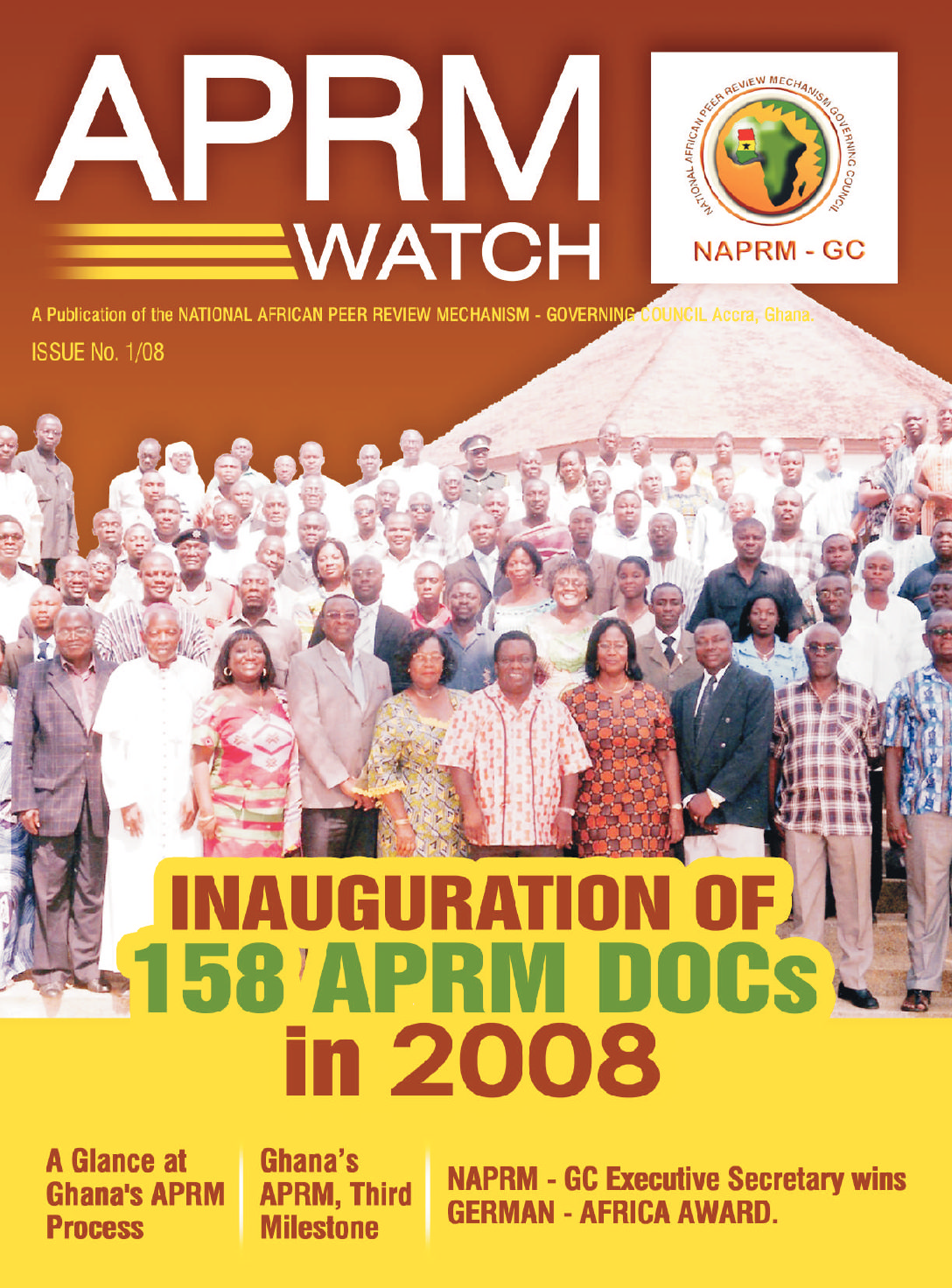Ghana’s African Peer Review Mechanism (APRM) Country Self-Assessment report in June 2005, identified inadequate consultations with local stakeholders in district level planning, budgeting, implementation and monitoring of policies and programmes at the local level as a major shortcoming in the attainment of good governance.
As a result, the concept of the District APRM Oversight Committees (DOCs) was mooted in 2008. The members of the DOCs are drawn from local level civil society, private sector, identifiable groups, vulnerable groups and public sector actors who reside in the district. They serve as the decentralized arm of the Governing Council that operates on a voluntary basis to sensitize and educate the populace on the principles and objectives of the APRM.
Through the help of development partners; UNDP, GIZ, Hanns Seidel Foundation among others, the NAPRM annually undertakes District Governance Assessment (DGA) surveys. Since 2009, the APRM secretariat has produced 4 major reports. The reports the DOCs generate from the governance assessments serve as the rallying point for local level engagements with duty bearers.
In 2015, the UNDP supported 40 districts from across the country to undertake governance assessments. In all, over 17,000 citizens participated in the surveys. Subsequently the data generated from the survey were sent back to the communities involved in the surveys for validation after engaging in dialogues with them.
Before the survey reports are finalized, validation workshops are held at which all stakeholders are given the opportunity to react to the findings contained in them. Authority bearers including local government officials and service providers including those providing utility services such as water and electricity as well as security agencies such as the Police are invited to participate in a dialogue with rights holders from civil society.
These non-political dialogue platforms are aimed at promoting the participation of citizens in decision-making at the local level.
These activities took place in the following local areas: Awutu Senya District, Agona West Municipal all in the Central Region and Suhum Municipal in the Eastern Region.
These are highlights of some issues that were of great interest to the people in the four APRM thematic areas:
DEMOCRACY AND GOOD POLITICAL GOVERNANCE
- In Suhum, the most democratic issue was the citizen’s ability to associate freely with a group or a political party without harassment, whilst in Awutu Senya it was the security of life and safety. Agona West had citizens’ lack of civic responsibility as their major democratic challenge.
- In all the three districts, it emerged that their MPs did not meet the citizenry on national issues before they spoke on their behalf in parliament.
- Even though most people in all instances indicated that they did not visit the assembly, the few that did said that they were always satisfied with the responses they received on their problems.
- The majority of the responses to the question on whether the assembly helps Persons with Disability (PWD), were in the negative. Reacting to this, the assemblies denied that this was the case but explained that there were challenges with the disbursement of the funds allocated to PWDs.
- The Agona West District Assembly indicated that they had created an account for the PWDs in which the funds had been transferred directly and so the assembly did not have direct oversight over them.
- The Suhum Municipal Assembly also indicated that, initially they were paying amounts to members of the PWD association who were few in number. They have now asked their assembly members to inform PWDs in their community to come and register with the Department of Social Welfare. Once they do that they will also receive their share of the funds from the District Assembly Common Fund.
- The majority of citizens also indicated that they did not know of the existence of a grievance mechanism at the assemblies.
ECONOMIC GOVERNANCE AND MANAGEMENT
- The most important economic issue found in Suhum was the rising cost of living, whilst in Agona West it was unemployment and corruption, and in Awutu Senya it was the rising cost of living and unemployment.
- In all 3 districts, respondents said that wage employment was either extremely difficult to obtain or non-existent.
- People’s perceptions about corruption range from nepotism, irregularities in awarding tenders and contracts, mal-administration of public funds, to giving bribes before services are rendered.
CORPORATE GOVERNANCE
- The major corporate governance issues identified were the rising cost of doing business and the difficulty in securing credit facility to do business.
- Respondents were of the view that access to telecommunications has improved but electricity has worsened.
- And almost all respondents indicated incurring losses as a result of the worsening state of electricity supply.

SOCIO-ECONOMIC DEVELOPMENT
The most important socio-economic issues identified in Suhum were road and transport, in Agona West they were education and garbage disposal, and in Awutu Senya it was education and garbage disposal.
Apparently, both Awutu Senya and Agona West, being from the Central Region, exhibit similar problems on all the issues.
Service provision:
- Education
- All 3 districts indicated that academic performance was satisfactory
- Health :- Asked whether they were satisfied with the provision of health care, most people were indifferent
- Water :- While citizens in Suhum were very dissatisfied with general water supply, citizens of Agona West and Awutu Senya indicated that they were satisfied.
- Garbage :- Garbage disposal is still a major challenge in the various districts as the adequacy of toilet facilities and the disposal of human waste.
- HIV/AIDS
A. It was observed that more women than men now know their HIV status.
B. Citizens believe that in the past year, education and sensitization on HIV/AIDS has been low. - Mental Health
A. Most citizens believe people only become mentally ill as a result of their abuse of narcotic drugs.
B. They also believe that the major drug abused in the communities is Indian hemp.
The most popular issues that emerged were socio-economic in nature, in particular services such as electricity, security, health, water, sanitation and education.
Even though issues concerning economic management and corporate governance were discussed, not much was said about them because citizens felt those issues went beyond the District and Municipal Assemblies.
Some questions that came up during plenary and their responses
Q – The report indicated that children are put in the same cells as adults.

Q – Are citizens required to pay any money before they can bail someone from the police station?
Response from the police
No one is required to pay any money before bail. But there is what they call a bail bond amount which one will have to pay in case the accused fails to show up at the police station or in court.
Q – Are civil servants and public servants exempted from communal labour?
Response from the Presiding Member
No one is exempted from communal labour.
Q – The report showed that teenage pregnancy is still a major issue in the communities. What can be done about it?
The report showed that teenage pregnancy is still a major issue in the communities. What can be done about it? Suggestions from participants A queen mother suggested that once teenage girls are impregnated by men, it should be considered defilement and be handled as such where the men involved would be punished according to the law to deter others. Another suggested that the assembly should come up with bye-laws to monitor and protect children. If a child is found on the streets in the night or during school hours, the parent should be held responsible and dealt with. The medical director in the Suhum municipality told participants that, while all these measures are being put in place, young girls who get pregnant should be encouraged to attend antenatal clinics to avoid loss of both mother and child. On the issue of electricity, so many issues came up that elicited the response of the director of operations, Electricity Company of Ghana (ECG) Agona West. He expressed his satisfaction with the findings of the survey; the fact that electricity services have been poor lately, the effects they have had on businesses, and the fact that citizens agreed services were improving. He reiterated the fact that ECG does not set the price of electricity, instead it is the PURC which it does in consultation with the ECG after considering all factors involved in providing electricity.

Q- Most people do not know their HIV /AIDS status. Can’t they be forced to be tested? And also more women know their status than men. Why? ResponseNo one can be forced to get tested for HIV/AIDS because the process is voluntary. It is true that most women know their status because every pregnant woman gets tested after counseling to prevent mother to child infection. It was identified in the report that majority of the respondents do not pay anything when they go for medical treatment but the participants disagreed with this notion.

 newsletter-compressed
newsletter-compressed